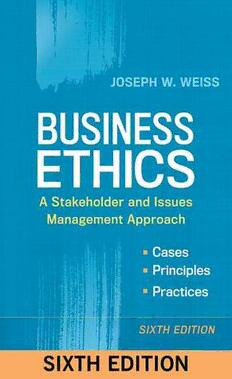
Business Ethics: A Stakeholder and Issues Management Approach PDF
Preview Business Ethics: A Stakeholder and Issues Management Approach
2 3 BUSINESS ETHICS 4 BUSINESS ETHICS A Stakeholder and Issues Management Approach SIXTH EDITION Joseph W. Weiss 5 Business Ethics Copyright © 2014 by Joseph W. Weiss All rights reserved. No part of this publication may be reproduced, distributed, or transmitted in any form or by any means, including photocopying, recording, or other electronic or mechanical methods, without the prior written permission of the publisher, except in the case of brief quotations embodied in critical reviews and certain other noncommercial uses permitted by copyright law. For permission requests, write to the publisher, addressed “Attention: Permissions Coordinator,” at the address below. Berrett-Koehler Publishers, Inc. 235 Montgomery Street, Suite 650 San Francisco, California 94104-2916 Tel: (415) 288-0260, Fax: (415) 362-2512 www.bkconnection.com Ordering information for print editions Quantity sales. Special discounts are available on quantity purchases by corporations, associations, and others. For details, contact the “Special Sales Department” at the Berrett-Koehler address above. Individual sales. Berrett-Koehler publications are available through most bookstores. They can also be ordered directly from Berrett-Koehler: Tel: (800) 929-2929; Fax: (802) 864-7626; www.bkconnection.com Orders for college textbook/course adoption use. Please contact Berrett-Koehler: Tel: (800) 929-2929; Fax: (802) 864-7626. Orders by U.S. trade bookstores and wholesalers. Please contact Ingram Publisher Services, Tel: (800) 509-4887; Fax: (800) 838-1149; E-mail: [email protected]; or visit www.ingrampublisherservices.com/Ordering for details about electronic ordering. Berrett-Koehler and the BK logo are registered trademarks of Berrett-Koehler Publishers, Inc. Sixth Edition Paperback print edition ISBN 978-1-62656-140-3 PDF e-book ISBN 978-1-62656-141-0 IDPF e-book ISBN 978-1-62656-142-7 2014-1 Book produced by: Westchester Publishing Services Cover design: Dan Tesser / pemastudio Interior illustration: Westchester Publishing Services Indexer: Robert Swanson 6 7 Brief Contents Chapter 1 Business Ethics, the Changing Environment, and Stakeholder Management Chapter 2 Ethical Principles, Quick Tests, and Decision-Making Guidelines Chapter 3 Stakeholder and Issues Management Approaches Chapter 4 The Corporation and External Stakeholders: Corporate Governance: From the Boardroom to the Marketplace Chapter 5 Corporate Responsibilities, Consumer Stakeholders, and the Environment Chapter 6 The Corporation and Internal Stakeholders: Values-Based Moral Leadership, Culture, Strategy, and Self-Regulation Chapter 7 Employee Stakeholders and the Corporation Chapter 8 Business Ethics and Stakeholder Management in the Global Environment 8 Contents Preface Acknowledgments Case Authorship Chapter 1 Business Ethics, the Changing Environment, and Stakeholder Management 1.1 Business Ethics and the Changing Environment Seeing the “Big Picture” Point/CounterPoint Environmental Forces and Stakeholders Stakeholder Management Approach 1.2 What Is Business Ethics? Why Does It Matter? What Is Ethics and What Are the Areas of Ethical Theory? Unethical Business Practices and Employees Ethics and Compliance Programs Why Does Ethics Matter in Business? Working for the Best Companies 1.3 Levels of Business Ethics Asking Key Questions Ethical Insight 1.1 1.4 Five Myths about Business Ethics Myth 1: Ethics Is a Personal, Individual Affair, Not a Public or Debatable Matter Myth 2: Business and Ethics Do Not Mix Myth 3: Ethics in Business Is Relative Myth 4: Good Business Means Good Ethics Myth 5: Information and Computing Are Amoral 1.5 Why Use Ethical Reasoning in Business? 1.6 Can Business Ethics Be Taught and Trained? 1.7 Plan of the Book 9 Chapter Summary Questions Exercises Real-Time Ethical Dilemma Cases 1. Bernard L. Madoff Investment Securities LLC: Wall Street Trading Firm 2. Cyberbullying: Who’s to Blame and What Can Be Done? Notes Chapter 2 Ethical Principles, Quick Tests, and Decision-Making Guidelines 2.1 Ethical Reasoning and Moral Decision Making Three Criteria in Ethical Reasoning Moral Responsibility Criteria 2.2 Ethical Principles and Decision Making Ethical Insight 2.1 Utilitarianism: A Consequentialist (Results-Based) Approach Universalism: A Deontological (Duty-Based) Approach Rights: A Moral and Legal Entitlement-Based Approach Justice: Procedures, Compensation, and Retribution Virtue Ethics: Character-Based Virtues The Common Good Ethical Relativism: A Self-Interest Approach Immoral, Amoral, and Moral Management 2.3 Four Social Responsibility Roles 2.4 Levels of Ethical Reasoning and Moral Decision Making Personal Level Organizational Level Industry Level Societal, International, and Global Levels 2.5 Identifying and Addressing Ethical Dilemmas 10
